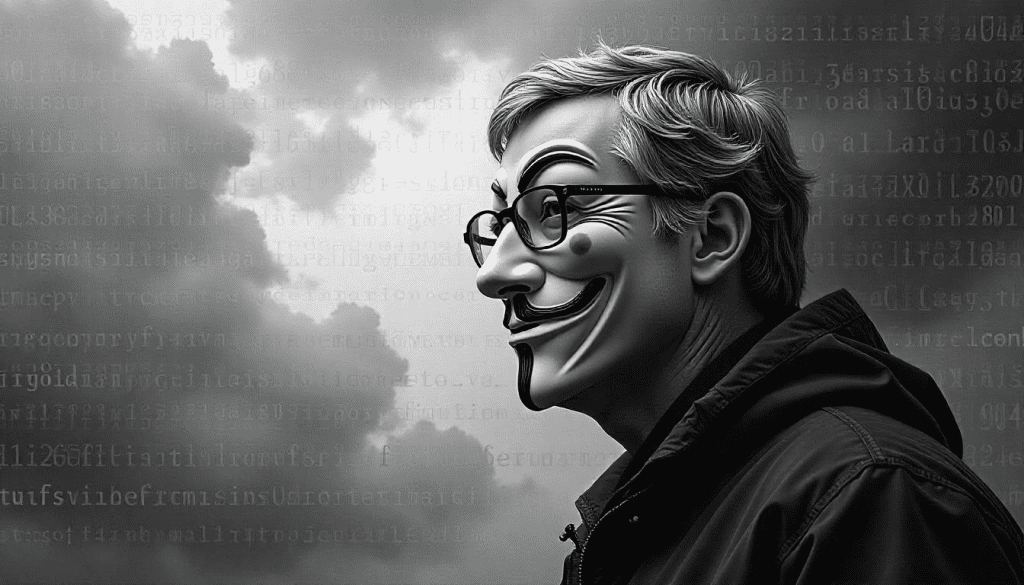In the modern digital age, two entities stand as symbols of contrasting ideals: Anonymous and Bill Gates. On one side, you have Anonymous, the elusive, decentralized group of hacktivists known for exposing corruption, fighting censorship, and challenging the establishment. On the other, you have Bill Gates, the co-founder of Microsoft, who revolutionized personal computing and later became one of the world’s most influential philanthropists. Their paths have occasionally clashed, making the conflict between these two forces an intriguing battle between digital activism and corporate power.

Who is Anonymous?
Anonymous is not a single person but a collective of hackers, activists, and whistleblowers who operate under a common ideology. Their main goal is to fight against government overreach, corporate greed, and internet censorship. They are well-known for their signature Guy Fawkes masks and their ability to launch cyberattacks, expose secrets, and bring attention to social issues.
Some of Anonymous’ most notable actions include:
- Exposing government surveillance programs.
- Taking down websites of oppressive regimes.
- Supporting movements like WikiLeaks, Occupy Wall Street, and Black Lives Matter.
- Targeting corporations accused of unethical practices.
Their activities often spark debates about the ethics of hacktivism and whether cyberattacks are justified forms of protest or dangerous crimes.
Who is Bill Gates?
Bill Gates is one of the most well-known figures in technology and philanthropy. As the co-founder of Microsoft, he played a crucial role in making personal computers accessible to the masses. After stepping down from his leadership role at Microsoft, he turned his focus toward global philanthropy through the Bill & Melinda Gates Foundation, which funds initiatives in healthcare, education, and climate change.
Some key aspects of Gates’ career include:
- Building Microsoft into a tech giant with products like Windows and Office.
- Accumulating vast wealth through software licensing and business innovation.
- Becoming one of the most prominent philanthropists in the world.
- Facing controversies regarding monopolistic business practices and corporate influence.
Despite his contributions to technology and charity, Gates has been criticized for his corporate decisions, influence over global health policies, and connections to powerful entities.
The Clashes: Anonymous vs Bill Gates
1. The Fight Against Corporate Influence
Anonymous has often targeted billionaires and large corporations, arguing that they wield too much power over global affairs. Gates, as one of the richest individuals in the world, has naturally come under scrutiny. Anonymous sees figures like Gates as representatives of a system where wealth and corporate interests influence public policy, sometimes at the expense of ordinary people.
2. Conspiracies and COVID-19 Misinformation
During the COVID-19 pandemic, Bill Gates became the center of multiple conspiracy theories, some of which claimed he was using vaccines as a tool for population control. While there is no credible evidence supporting these theories, they gained traction in online communities, some of which Anonymous has been linked to.
Anonymous, however, has also criticized the way pharmaceutical corporations, many of which Gates has invested in, have controlled vaccine distribution. The group has accused billionaires of profiting from crises while ordinary people suffer.
3. Microsoft’s Business Practices and Monopoly Concerns
Anonymous has long criticized monopolistic practices in the tech industry. Microsoft, under Gates’ leadership, was accused of using unfair business tactics to dominate the market, leading to an antitrust lawsuit in the late 1990s.
While Gates has since moved on to philanthropy, Anonymous remains skeptical of large tech corporations and their influence over the internet, privacy, and digital freedom.
4. The Role of Philanthropy in Global Decision-Making
The Bill & Melinda Gates Foundation funds a wide range of global initiatives, including disease eradication, education reform, and climate change solutions. While many view these contributions as positive, critics argue that private philanthropy should not have so much influence over global policies.
Anonymous, along with other critics, has raised concerns about how billionaires like Gates can shape public policy without democratic oversight. They argue that decisions affecting millions should not be dictated by a small group of wealthy individuals.
The Bigger Picture: What This Battle Represents
The conflict between Anonymous and Bill Gates is more than just a personal battle; it represents a larger struggle between hacktivists and corporate influence. It raises important questions:
- Should billionaires have so much control over global affairs?
- Is hacktivism a legitimate form of protest, or does it create more harm than good?
- How do we balance technological innovation with ethical responsibility?
- Who should control the internet and digital rights—corporations, governments, or the people?
The Future of the Battle
While Bill Gates continues to focus on philanthropy, Anonymous remains active, challenging corporations, governments, and institutions they perceive as unethical. Their methods differ—Gates uses wealth and business strategies to drive change, while Anonymous uses cyberattacks and public exposure to resist corporate control.
This battle will likely continue as concerns over corporate influence, digital privacy, and economic inequality grow. Whether you see Anonymous as heroes or criminals, and Gates as a visionary or a symbol of corporate dominance, one thing is clear: the clash between big tech, wealth, and digital activism is shaping the future of our world.
Conclusion
The story of Anonymous vs Bill Gates is not just about one billionaire and one hacker group. It is about the fight for control over technology, privacy, and global influence. While Gates represents wealth-driven change and philanthropy, Anonymous stands for resistance against unchecked corporate power.
As technology continues to evolve, these clashes will likely become even more significant. Whether you support Anonymous, Gates, or neither, their impact on society cannot be ignored. The real question is: Who should hold power in shaping our digital and global future—corporations, governments, or the people?
What do you think? Is Anonymous justified in their criticisms of Bill Gates, or is Gates simply using his wealth to make the world a better place? The debate is far from over.